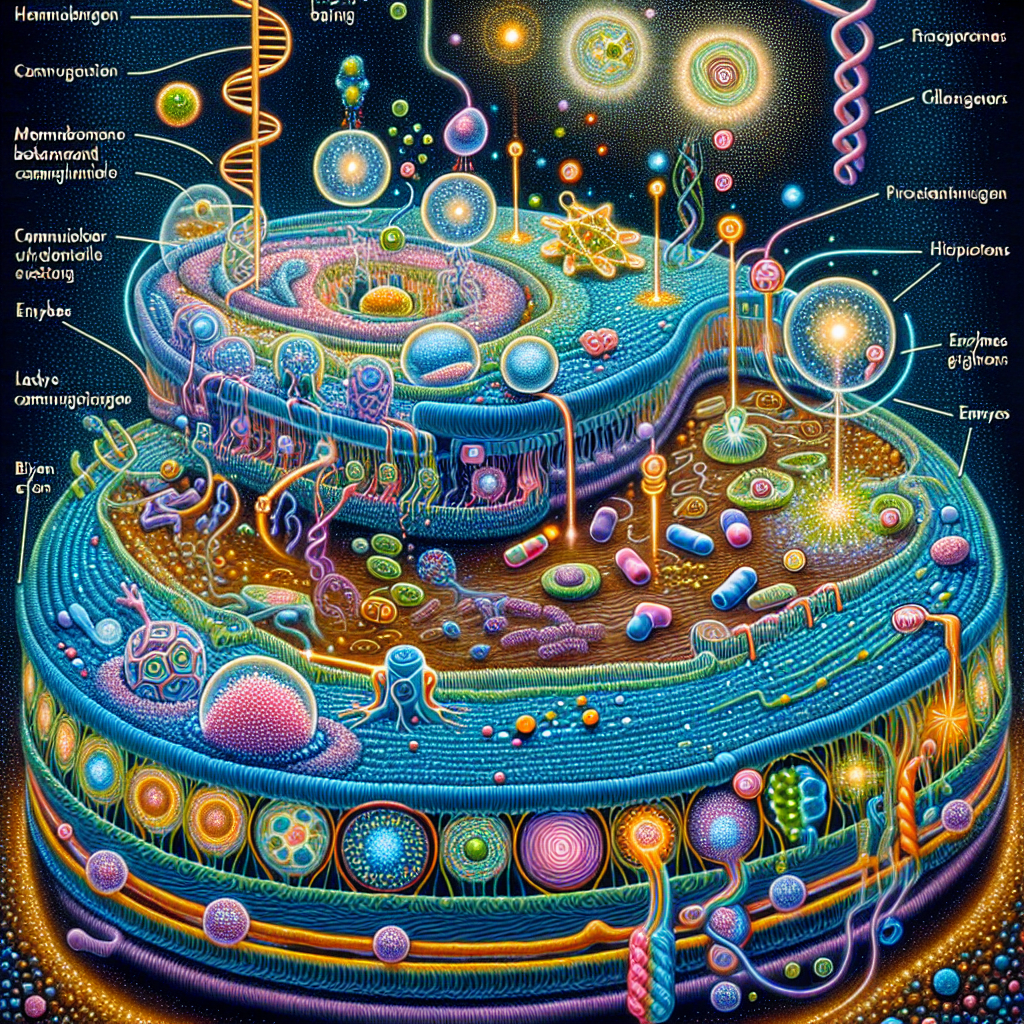Signal Transduction Pathways: Communicating Life’s Signals
-
Table of Contents
- Signal Transduction Pathways: Mastering Cellular Communication
- Understanding the Basics of Signal Transduction
- Key Signal Transduction Pathways and Their Functions
- Examples and Case Studies
- Signal Transduction in Drug Development
- Statistics and Trends in Signal Transduction Research
- Conclusion: The Future of Signal Transduction
- Discover ETprotein’s High-Quality Protein Products
Signal Transduction Pathways: Mastering Cellular Communication

Life, at its core, is about communication. Cells, the building blocks of life, are no exception to this rule. They communicate through complex networks known as signal transduction pathways. These pathways are the means by which cells respond to external stimuli, communicate with each other, and make crucial decisions for survival, growth, and development. Understanding these pathways is not only fundamental to biology but also critical for advancing medical science and developing new therapies.
Understanding the Basics of Signal Transduction
Signal transduction is the process by which a chemical or physical signal is transmitted through a cell as a series of molecular events, most commonly protein phosphorylation catalyzed by protein kinases, which ultimately results in a cellular response. These pathways can regulate a multitude of functions, from gene expression to cell death.
- Receptors: These are proteins on the cell surface or within the cell that recognize and bind to signaling molecules.
- Second Messengers: Small molecules that propagate the signal within the cell after the receptor is activated.
- Protein Kinases: Enzymes that transfer phosphate groups to proteins, a key step in turning signals into actions.
- Transcription Factors: Proteins that regulate gene expression in response to signals.
Key Signal Transduction Pathways and Their Functions
Several key pathways are central to cellular communication. Each pathway is responsible for different aspects of cellular function and is activated by distinct signals.
- The MAPK/ERK Pathway: Involved in cell division and differentiation.
- The PI3K/AKT Pathway: Plays a role in cell survival and metabolism.
- The JAK/STAT Pathway: Important for immune response and cell growth.
- The Wnt Signaling Pathway: Crucial for embryonic development and stem cell maintenance.
- The Notch Signaling Pathway: Involved in cell differentiation, especially in neural and immune cells.
Examples and Case Studies
Real-world examples illustrate the importance of signal transduction pathways in health and disease.
- Cancer: Many cancers are linked to mutations in components of signal transduction pathways, leading to uncontrolled cell growth and division.
- Diabetes: Insulin resistance, a hallmark of type 2 diabetes, involves the disruption of signaling pathways that regulate glucose uptake and metabolism.
- Neurodegenerative Diseases: Dysregulation of signaling pathways can lead to the death of neurons, contributing to diseases like Alzheimer’s and Parkinson’s.
Signal Transduction in Drug Development
Understanding signal transduction pathways has profound implications for drug development. By targeting specific components of these pathways, researchers can develop therapies that are more precise and have fewer side effects.
- Targeted Cancer Therapies: Drugs like Gleevec inhibit specific kinases involved in cancer cell proliferation.
- Anti-Inflammatory Drugs: Medications that block certain signaling molecules can reduce inflammation in conditions like arthritis.
- Neuroprotective Agents: Compounds that modulate signaling pathways may protect neurons from damage or death.
Statistics and Trends in Signal Transduction Research
The field of signal transduction is rapidly growing, with significant investments in both academic and pharmaceutical research. The global market for signal transduction therapies (kinase inhibitors, for example) is expected to reach billions of dollars, reflecting their importance in treating diseases.
Conclusion: The Future of Signal Transduction
Signal transduction pathways are at the heart of cellular communication and play a pivotal role in the functioning of life. The study of these pathways not only sheds light on fundamental biological processes but also paves the way for innovative treatments for a range of diseases. As research continues to unravel the complexities of these pathways, we can expect to see new breakthroughs in medicine that harness the power of cellular communication.
Discover ETprotein’s High-Quality Protein Products
For those in the field of life sciences, access to high-quality protein products is essential for studying signal transduction pathways. ETprotein offers a range of superior protein products that can support research and development in this critical area.
Their product line includes:
- Organic rice protein
- Clear rice protein
- Pea protein
- Clear pea protein
- Pumpkin seed protein
- Sunflower seed protein
- Mung bean protein
- Peanut protein
ETprotein’s offerings are characterized by their neutral taste, non-GMO, and allergen-free attributes, making them suitable for a wide range of applications in various industries. Whether for nutraceuticals, pharmaceuticals, or food and beverage products, ETprotein provides the quality and reliability that researchers and manufacturers need.
About ETprotein:
ETprotein, a reputable protein Chinese factory manufacturer and supplier, is renowned for producing, stocking, exporting, and delivering the highest quality organic bulk vegan protein and plant proteins. They include Organic rice protein, clear rice protein, pea protein, clear pea protein, pumpkin seed protein, sunflower seed protein, mung bean protein, peanut protein etc. Their offerings, characterized by a neutral taste, non-GMO, allergen-free attributes, cater to a diverse range of industries. They serve nutraceutical, pharmaceutical, cosmeceutical, veterinary, as well as food and beverage finished product distributors, traders, and manufacturers across Europe, USA, Canada, Australia, Thailand, Japan, Korea, Brazil, and Chile, among others.
ETprotein specialization includes exporting and delivering tailor-made protein powder and finished nutritional supplements. Their extensive product range covers sectors like Food and Beverage, Sports Nutrition, Weight Management, Dietary Supplements, Health and Wellness Products, and Infant Formula, ensuring comprehensive solutions to meet all your protein needs.
As a trusted company by leading global food and beverage brands and Fortune 500 companies, ETprotein reinforces China’s reputation in the global arena. For more information or to sample their products, please contact them and email sales(at)ETprotein.com today.












